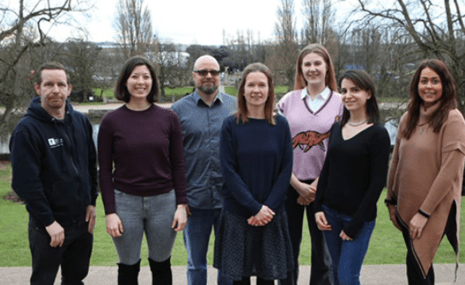
OPAD Assisted devices for healthcare
OPAD is a multi-faculty, staff-student initiative on which members collaborate in creating assistive and rehabilitation devices for community and healthcare partners.
Since its inception in 2016, OPAD has evolved into a cross-university initiative, encompassing staff and students from diverse backgrounds across all engineering departments, Medicine and Health Sciences, Computer Science, Science, and Humanities. Students with complementary skills collaborate in multidisciplinary teams, supported by research, technical, academic, and administrative staff, as well as end-user clients and representatives, to ensure projects address end-user needs.
Assistive devices are tools that help individuals perform daily tasks that they struggle with due to illness, accidents, or disabilities. OPAD collaborates with community and healthcare partners such as Able Orchestra, Lark Hill Retirement Village, and Nottingham University Hospitals NHS Trust, providing student groups the opportunity to engage with healthcare professionals and potential users of their devices. This user-centric design approach enables the development of bespoke devices that make a tangible difference. Current projects include: ear defenders for premature babies vulnerable to noise-induced stress; bespoke instrument controllers for disabled teenage musicians; and adaptive design of chemistry lab equipment to enhance accessibility for disabled students. Unlike standard group projects, most OPAD initiatives aim to hand over the devices to community or healthcare partners, rather than stopping at research prototypes.
The leadership team's complementary expertise has enabled rigorous processes to be established, ensuring recipient safety and regulatory compliance. OPAD offers an authentic and collaborative learning environment, inspiring all participants to share their knowledge and enhance their skills, regardless of their career level or role.
For students, OPAD provides the opportunity to apply the knowledge and technical skills gained from their courses to real-life problems, whilst simultaneously acquiring valuable transferable skills that enhance their employability.
OPAD members (left to right): Jason Young, Dr Arielle Torres, Professor David Branson, Professor Ruth Goodridge, Emily Andrews, Dr Anna Lion, Victoria Cameron 
By fostering an inclusive group attractive to a wide range of student and staff groups, including those from traditionally underrepresented backgrounds, an environment where students and staff learn from each other, and where research and teaching activities are deeply interlinked has been created. OPAD began as an informal, volunteer activity; though shared decision-making, clear systems and processes are now established for training and ensuring safe handover.
Through brainstorming and sharing of expertise, challenges are resolved such as traversing distinct faculty structures, ethical and regulatory issues, logistical challenges caused by multi-year, multi-programme team-based activities, which would have not been achieved without the diverse skill set in the core team. The OPAD team continually learn from the problem-solving process, enhancing their practice and learning for students. They have created a model based on their experiences, that can be embedded as a mechanism for working with external healthcare partners.
Through brainstorming and sharing of expertise, the teams overcame challenges ssuch as traversing distinct faculty structures, ethical and regulatory issues, logistical challenges caused by multi-year, multi-programme team-based activities, which would have not been achieved without the diverse skill set in the core team. These achievements would not have been possible without the diverse skill set within the core team. The OPAD team continually learns from the problem-solving process and enhancing their practice and have developed a model based on their experiences that can be embedded as a mechanism for working with external healthcare partners.
Do you think you can contribute?
If you are a staff member or a current PhD student, you can be part of the OPAD team. You can do this is the following ways:
- Join a group to work with students to address challenging problems.
- Mentor a group to support their progress.
- Share your knowledge and expertise by giving guest lectures.
- Become an OPAD Expert by providing advice and guidance in your area of expertise to groups when needed.
- Become an OPAD Ambassador to help publicise OPAD by word of mouth to gain contacts for potential projects.
- Offering group and individual projects on related OPAD subjects.
- Be formally involved with helping to set-up projects, relations with other disciplines and industrial partners, running workshops, etc.
OPAD showcase
Every year, OPAD celebrates and showcases the work of our student groups.
Past projects information coming up soon.